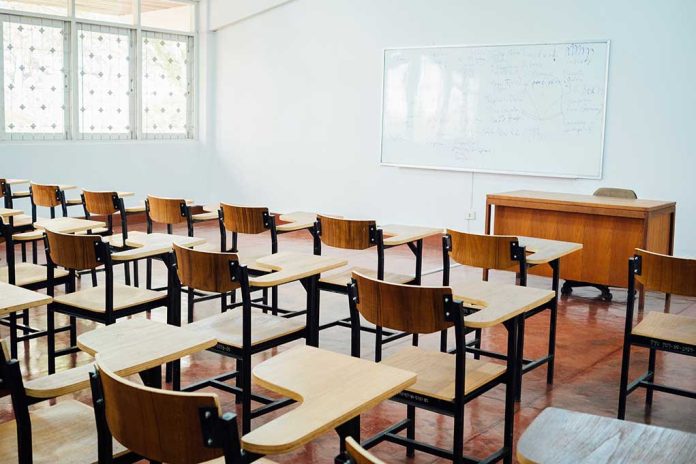
New Hampshire boldly shattered the traditional public education model, becoming the 17th state to implement universal school choice with a groundbreaking law that allows nearly all families access to education vouchers regardless of income level.
Key Takeaways
- Governor Kelly Ayotte signed legislation making New Hampshire’s Education Freedom Accounts (EFA) program universal, removing previous income cap requirements.
- Families will receive at least $4,265 per child for educational expenses, with up to $9,676 available for children with additional needs starting July 2025.
- New Hampshire is the first Democrat-leaning state to embrace universal school choice, despite voting for Kamala Harris in the 2024 election.
- A 10,000-student cap is initially set for the 2025-2026 school year, with provisions for 25% annual increases if enrollment exceeds 90% of the cap.
- Critics, primarily Democrats and teachers’ unions, argue the program will divert critical funding from public schools and primarily benefit wealthy families.
A Conservative Victory for Parental Rights
Governor Kelly Ayotte’s signature on the universal school choice bill marks a significant triumph for educational freedom in New Hampshire. The legislation expands the state’s Education Freedom Accounts program beyond its previous income restrictions, allowing virtually all families to access state education funds for private school tuition, homeschooling expenses, and other alternative education options. This dramatic policy shift empowers parents to make educational decisions based on their children’s specific needs rather than being locked into potentially underperforming public schools dominated by teachers’ unions.
The expanded program provides substantial financial support, with families receiving at least $4,265 per child for educational expenses, and up to $9,676 for children with additional needs. Previously, less than half of New Hampshire students qualified for these vouchers due to income restrictions. This expansion represents a direct challenge to the public education monopoly that has consistently failed many American children while consuming ever-increasing taxpayer dollars with disappointing results.
Breaking New Ground in a Blue State
What makes New Hampshire’s universal school choice program particularly noteworthy is that it represents the first such initiative in a Democrat-leaning state. Despite voting for Kamala Harris in the 2024 presidential election, New Hampshire has joined 16 other predominantly Republican-led states in embracing educational freedom. This breakthrough suggests that parents’ frustration with traditional public education transcends party lines, especially following the educational disruptions caused by pandemic school closures that revealed the undue influence of teachers’ unions over education policy.
“New Hampshire is the 17th state to pass universal school choice in the past four years. The wind is at our backs and the momentum for education freedom is unstoppable. We have a state that went for Kamala Harris in November now going all-in on school choice. Putting parents in the driver’s seat should be a nonpartisan issue – kids don’t belong to the government – but the Democrat Party is a wholly owned subsidiary of the teachers unions,” Said Corey DeAngelis, senior fellow at the American Federation for Children.
The program is structured thoughtfully, with universal eligibility beginning in July 2025 and an initial cap of 10,000 students for the 2025-2026 school year. The legislation includes a mechanism for 25% annual increases in the cap if enrollment exceeds 90% of the current limit, ensuring sustainable growth. Governor Ayotte’s original proposal was actually less expansive, maintaining income caps for certain students, but Republican lawmakers pushed for full universality in the final bill that landed on her desk.
The Left’s Predictable Opposition
As expected, Democrats and teachers’ unions have vehemently opposed the universal school choice program. Their criticisms follow familiar lines – claiming the initiative will divert funds from public schools and primarily benefit wealthy families. These arguments deliberately ignore the reality that the current public education system traps many children, especially those from disadvantaged backgrounds, in failing schools while denying parents any meaningful alternative. The universal voucher program finally levels the playing field, giving all families access to educational options previously available only to the wealthy.
“Giving parents the freedom to choose the education setting that best fits their child’s needs will help every student in our state reach their full potential. I’m proud to sign this into law today along with the Parental Bill of Rights, which ensures parents are the central voice in their children’s education. I thank the House and Senate for working to get these across the finish line,” Said Kelly Ayotte, Governor of New Hampshire.
The leftist opposition to school choice has become increasingly transparent as a defense of bureaucratic power rather than educational quality. State Education Commissioner Frank Edelblut has rightly characterized the program as transformative for students, while Republican Senator Victoria Sullivan emphasized that the bill delivers “universal school choice for all New Hampshire families.” These reforms recognize the fundamental truth that parents, not government officials or union leaders, should have the primary authority over their children’s education.
A National Movement Gains Momentum
New Hampshire’s adoption of universal school choice adds to the growing momentum of this nationwide movement. Arizona pioneered universal school choice in 2022, offering approximately $7,000 per child for educational expenses. The rapid expansion to 17 states in just four years demonstrates the powerful appeal of educational freedom to parents who witnessed firsthand how teachers’ unions prioritized their own interests over children’s educational needs during the pandemic. This movement recognizes that education funding should follow the student rather than being automatically funneled to government-run institutions regardless of performance.
“The teachers unions really stepped in it by fighting to keep schools closed during the COVID era,” Said Corey DeAngelis, senior fellow at the American Federation for Children.
As more states embrace universal school choice, the educational landscape in America is being fundamentally reshaped. The old model of assigning children to schools based solely on zip code is giving way to a system that respects parental authority and creates genuine competition to improve educational outcomes. New Hampshire’s bold move represents another important victory in this crucial battle for America’s future, empowering parents while challenging the left’s stranglehold on education. This conservative vision of educational freedom continues to gain ground despite fierce resistance from those invested in preserving the failing status quo.



